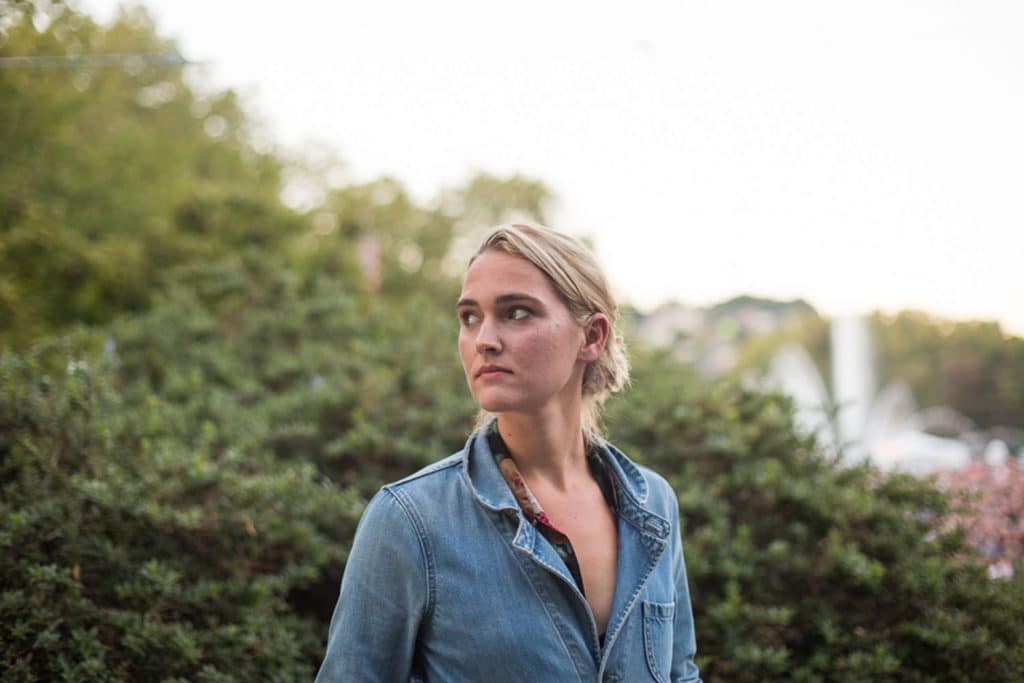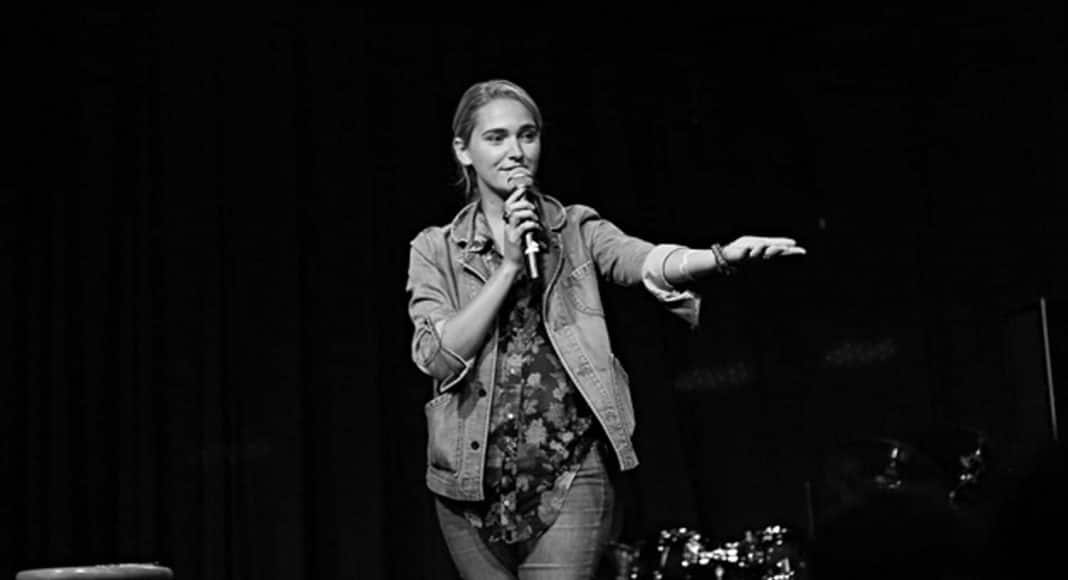Jena Friedman doesn’t intend to offend you, but she can’t help it if you are. The stand-up comic and former Late Show with David Letterman writer has made a career out of probing the uncomfortable and the confrontational. For example, her latest special out on Seeso TV Oct. 20, is named “American Cunt.” It’s a name both provocative and informative: there will be political and dark humor that will make you laugh and cringe that you’re laughing at this type of subject mattter. And if not, at least Friedman warned you.
But politics is very much on Friedman’s mind. She served as a former Daily Show field producer under Jon Stewart, and has a featured role in Undecided: The Movie, a political satire following two undecided voters across the country out Oct. 18 on iTunes. As mind-numbing and infuriating as this election cycle has been, Friedman can still find the funny in it.
“I think one of the greatest satirical comedians right now is Donald Trump,” she says. “In the sense that he doesn’t apologize, and even though it’s inhumane and fucked up, he’s gotten away with so much by just never apologizing. And it’s creepy. It’s terrifying, but it’s also fascinating.”
She also added, “What he did do is break up the Republican party and expose the racism and misogyny in America that we thought we could ignore for so long. That’s why I think he’s a culturally powerful performance artist.”
Ahead of the release of her special, Friedman chatted with The Fresh Toast over the phone about her comedy style, offending audiences, and how she considers herself more of an activist than an artist.

The Fresh Toast: Everyone kind of describes your humor as pitch-black, and you always try to put a darker spin on certain subjects. I wanted to know why you decided to take that route with your comedy?
Jena Friedman: I was always interested in dark stuff. I had a very healthy, loving childhood. My dad was a doctor and would always give me dark things to read, like Roald Dahl and Edward Gorey, and I always thought it was funny. I remember we saw Dracula when I was little. My sister, who’s four years older than me, was like terrified of it and I loved it. I just kind of always liked dark, macabre things.
Being Jewish, you have an inherent anxiety and at some point I thought comedy was a good way to like—I don’t really have a lot of anxiety. I don’t know when I first discovered that you can joke about things that we’re afraid of and are scary. I think a lot of my stand-up that isn’t political falls into that category. And even the stuff that is—like right now, politics is so insane and terrifying, we can’t talk about without comedy because it’s in the realm of the absurd already.
Your comedy reminds of that. You seem to put out these almost confrontational ideas but it comes from this very honest place. Are you ever worried about people not getting the joke?
I’m not worried about it, but it’s definitely happened a lot. It’s fine. There’s enough people consuming this stuff that if people don’t get you, [it doesn’t mean] you don’t have enough of an audience that does. I think more frustrating is people taking it out of context or not really understanding what’s behind what you’re saying.
And a lot of the stuff in the show is confrontational. Actually what I’m saying is pretty mild, but if it’s about abortion, someone might freak out because it’s abortion, but they’re not listening to what you’re saying. That’s always the risk when you talk about those things.
Is there any topics you think are off-limits?
No. I think it’s finding way to do it responsibly. I know this sounds vague, but have humanity. I don’t like talking about people’s looks, you know—unless there’s a point to do it, not just saying something to be shocking. It’s tough because the subjects I cover are shocking, but I’m not trying to shock, if that makes sense.
Well, naming your special something like “American Cunt” is something some people will say is just shocking. I don’t think it is. It captures what you’re going for with your political tone and the feminist bent that you have. But how did that name come about for you?
The special came out of an earlier version of a show I did for the Edinburgh Fringe Festival. And in the UK, “cunt” is a term of endearment, it’s a very innocuous term. The show was specifically for a British and Scottish audience. I remember thinking, “They don’t know who I am. I want to talk about things without having to offer a disclaimer. If I call the show that, then it gives me license to say what I want.” Because worst-case scenario, someone’s going to be like, “Who’s this American cunt coming over here?”
Also, it’s good because if you call the show that, then you immediately weed out people who wouldn’t want to see that. I don’t want to preach to the choir, but I don’t want to make people feel bad. That’s not the goal. I remember even during the Edinburgh show—which is different than the version that’s coming out on Seeso—I had walkouts during the show.
https://www.youtube.com/watch?v=F3welkzWgzA
I had this joke about cancer. Not making fun of people with cancer, but talking about how we can all joke about it because everyone’s going to get it. The basic idea was like, we all know someone who has cancer. If you don’t know someone with cancer, like, get out there. Live a little. Meet people.
That joke I felt was pretty innocuous, but a woman walked out. I had some stuff I was talking about with Ebola at the time and all sorts of other things, and she lasted through that. But the cancer thing, she just walked out. It’s sad—she obviously had her own stuff going on—but it’s fascinating you can call the show that, and you can still get people walking out.
As a satirist yourself, how do you approach making fun of a guy like Donald Trump?
In the show, I talk about him. I talk about how he’s not funny. It was really fascinating, writing that show. It changed throughout this year. There was one point, last year in Edinburgh, I mentioned Trump’s name and it got such a big laugh, I felt like cheap or guilty of it. I was like, don’t even talk about him. He’s gonna be a non-issue, so don’t even write any jokes about him.
Six months later, I had like 15 minutes on Trump, where people were still finding it funny. And I was like, it’s not funny anymore. It felt really powerful to do it, and it was really working, but then one day, he stopped being funny. None of the jokes worked. So I had to change the whole show in relationship to how we were viewing him.
How would you approach someone close in your life, or someone you know who said they were pro-Trump or voting for him?
I have a relative, two of them, who live in a swing state. They haven’t said they’re voting for Trump, but they did not want to support Hillary. This was three or four months ago so I think it’s changed. But really it hurt our relationship. I send them every article I can, articles from the
Centrist-right wing endoresements to Hillary. I don’t think they’re pro-Trump, but I think they’re of a different generation and have been exposed to a lot of criticism of Hillary and it’s changed their view of her. But it’s devastating. I’m still close with them and I emailed them recently, and I think they’re voting for her, I hope, but it did get to the point where it messed with our relationship.
I have a dear friend who has a grandmother—I met her grandmother once like a decade ago at graduation. And I literally called her grandmother trying to get her to vote for Hillary. But yeah, it’s unconscionable at this point [to vote for Trump], as it’s been since he started running. No one with half a brain or any sense of morality can vote for him. The people who want to vote Gary Johnson or Jill Stein—I just would urge people if they can’t vote for Hillary, just don’t vote. It’s tough.
Would you consider an activist or is activism just an inherent part of art?
I always felt like more of an activist. I know every comedian—like Jon Stewart and Oliver—would be like, I’m a comedian. But I’m, like, an activist. It’s funny, but I don’t care. I’ve gotten into arguments with people, but I don’t know. Maybe it’s not as strategic to wear your heart on your sleeve that way, but yeah, I would say, I am an activist over a comedian because that’s just what I’m passionate about.
So considering your activism stance, how do you feel about marijuana legalization and how that will shape moving forward?
It’s great. I’m not like a big stoner. I have smoked pot. It kind of just makes me hungry. Yeah, I’m totally for it. I think that hopefully as the industry expands that it will take a note from other industries and be very egalitarian in terms of gender and really respect workers and make sure people aren’t exploited. That’s my biggest concern with any industry, right? But yeah, I’m all for it.
*This interview has been condensed and edited for clarity.


